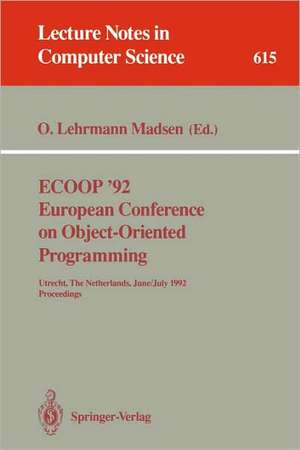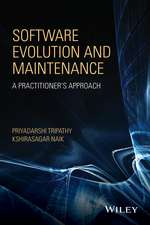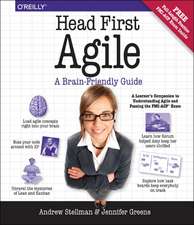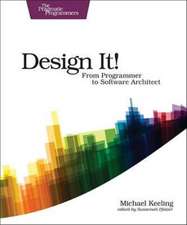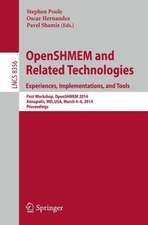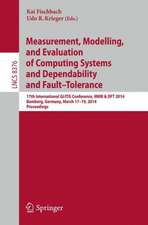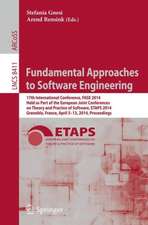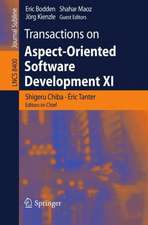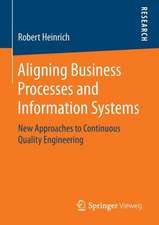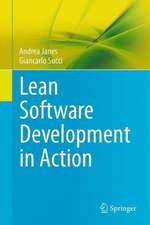ECOOP '92. European Conference on Object-Oriented Programming: Utrecht, The Netherlands, June 29 - July 3, 1992. Proceedings: Lecture Notes in Computer Science, cartea 615
Editat de Ole Lehrmann Madsenen Limba Engleză Paperback – 16 iun 1992
Din seria Lecture Notes in Computer Science
- 20%
 Preț: 1061.55 lei
Preț: 1061.55 lei - 20%
 Preț: 307.71 lei
Preț: 307.71 lei - 20%
 Preț: 438.69 lei
Preț: 438.69 lei - 20%
 Preț: 645.28 lei
Preț: 645.28 lei -
 Preț: 410.88 lei
Preț: 410.88 lei - 15%
 Preț: 580.46 lei
Preț: 580.46 lei - 17%
 Preț: 427.22 lei
Preț: 427.22 lei - 20%
 Preț: 596.46 lei
Preț: 596.46 lei -
 Preț: 449.57 lei
Preț: 449.57 lei - 20%
 Preț: 353.50 lei
Preț: 353.50 lei - 20%
 Preț: 1414.79 lei
Preț: 1414.79 lei - 20%
 Preț: 309.90 lei
Preț: 309.90 lei - 20%
 Preț: 583.40 lei
Preț: 583.40 lei - 20%
 Preț: 1075.26 lei
Preț: 1075.26 lei - 20%
 Preț: 310.26 lei
Preț: 310.26 lei - 20%
 Preț: 655.02 lei
Preț: 655.02 lei - 20%
 Preț: 580.93 lei
Preț: 580.93 lei - 20%
 Preț: 340.32 lei
Preț: 340.32 lei -
 Preț: 381.21 lei
Preț: 381.21 lei - 20%
 Preț: 591.51 lei
Preț: 591.51 lei - 15%
 Preț: 438.59 lei
Preț: 438.59 lei - 20%
 Preț: 337.00 lei
Preț: 337.00 lei -
 Preț: 389.48 lei
Preț: 389.48 lei - 20%
 Preț: 607.39 lei
Preț: 607.39 lei - 20%
 Preț: 1024.44 lei
Preț: 1024.44 lei - 20%
 Preț: 579.30 lei
Preț: 579.30 lei - 20%
 Preț: 763.23 lei
Preț: 763.23 lei - 20%
 Preț: 453.32 lei
Preț: 453.32 lei - 20%
 Preț: 575.48 lei
Preț: 575.48 lei - 20%
 Preț: 585.88 lei
Preț: 585.88 lei - 20%
 Preț: 825.93 lei
Preț: 825.93 lei - 20%
 Preț: 763.23 lei
Preț: 763.23 lei - 17%
 Preț: 360.19 lei
Preț: 360.19 lei - 20%
 Preț: 1183.14 lei
Preț: 1183.14 lei - 20%
 Preț: 340.32 lei
Preț: 340.32 lei - 20%
 Preț: 504.57 lei
Preț: 504.57 lei - 20%
 Preț: 369.12 lei
Preț: 369.12 lei - 20%
 Preț: 583.40 lei
Preț: 583.40 lei - 20%
 Preț: 343.62 lei
Preț: 343.62 lei - 20%
 Preț: 350.21 lei
Preț: 350.21 lei - 20%
 Preț: 764.89 lei
Preț: 764.89 lei - 20%
 Preț: 583.40 lei
Preț: 583.40 lei - 20%
 Preț: 649.49 lei
Preț: 649.49 lei - 20%
 Preț: 341.95 lei
Preț: 341.95 lei - 20%
 Preț: 238.01 lei
Preț: 238.01 lei - 20%
 Preț: 538.29 lei
Preț: 538.29 lei
Preț: 339.66 lei
Preț vechi: 424.58 lei
-20% Nou
Puncte Express: 509
Preț estimativ în valută:
64.99€ • 68.03$ • 54.10£
64.99€ • 68.03$ • 54.10£
Carte tipărită la comandă
Livrare economică 31 martie-14 aprilie
Preluare comenzi: 021 569.72.76
Specificații
ISBN-13: 9783540556688
ISBN-10: 3540556680
Pagini: 440
Ilustrații: XI, 429 p.
Dimensiuni: 155 x 233 x 23 mm
Greutate: 0.62 kg
Ediția:1992
Editura: Springer Berlin, Heidelberg
Colecția Springer
Seria Lecture Notes in Computer Science
Locul publicării:Berlin, Heidelberg, Germany
ISBN-10: 3540556680
Pagini: 440
Ilustrații: XI, 429 p.
Dimensiuni: 155 x 233 x 23 mm
Greutate: 0.62 kg
Ediția:1992
Editura: Springer Berlin, Heidelberg
Colecția Springer
Seria Lecture Notes in Computer Science
Locul publicării:Berlin, Heidelberg, Germany
Public țintă
ResearchCuprins
On unifying relational and object-oriented database systems.- Import is not inheritance why we need both: Modules and classes.- Object-oriented multi-methods in Cecil.- Aggregation in a behavior oriented object model.- Reasoning and refinement in object-oriented specification languages.- Combining object-oriented and logic paradigms: A modal logic programming approach.- An incremental class reorganization approach.- System design by composing structures of interacting objects.- Unifying the design and implementation of user interfaces through the object paradigm.- Nesting actions through asynchronous message passing : The ACS protocol.- Inheritance of synchronization constraints in concurrent object-oriented programming languages.- EPEE: an eiffel environment to program distributed memory parallel computers.- Using object-oriented programming techniques for implementing ISDN supplementary services.- An object model for engineering design.- An object-oriented class library for scalable parallel heuristic search.- Integrating constraints with an object-oriented language.- Specifying reusable components using contracts.- ACTS: A type system for object-oriented programming based on abstract and concrete classes.- Making type inference practical.- A reflective model of inheritance.- An object-oriented language-database integration model: The composition-filters approach.- Supporting physical independence in an Object Database Server.- Developing a class hierarchy for object-oriented transaction processing.
Caracteristici
Includes supplementary material: sn.pub/extras
